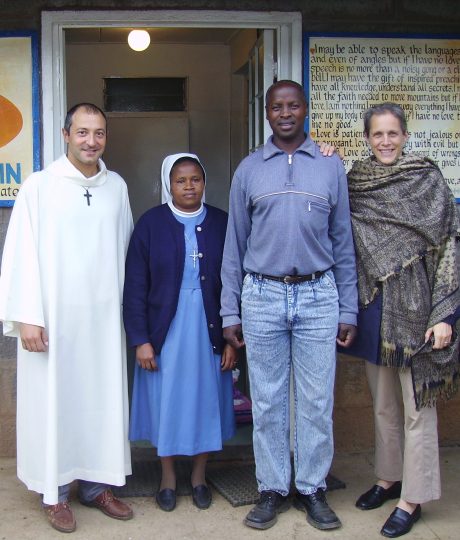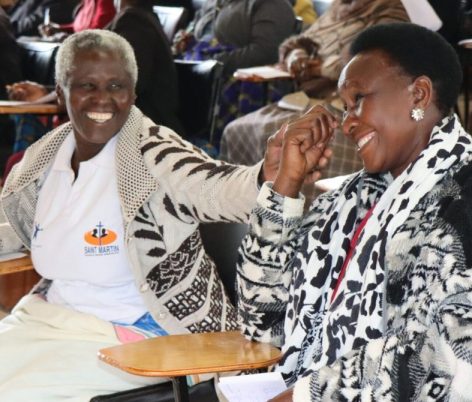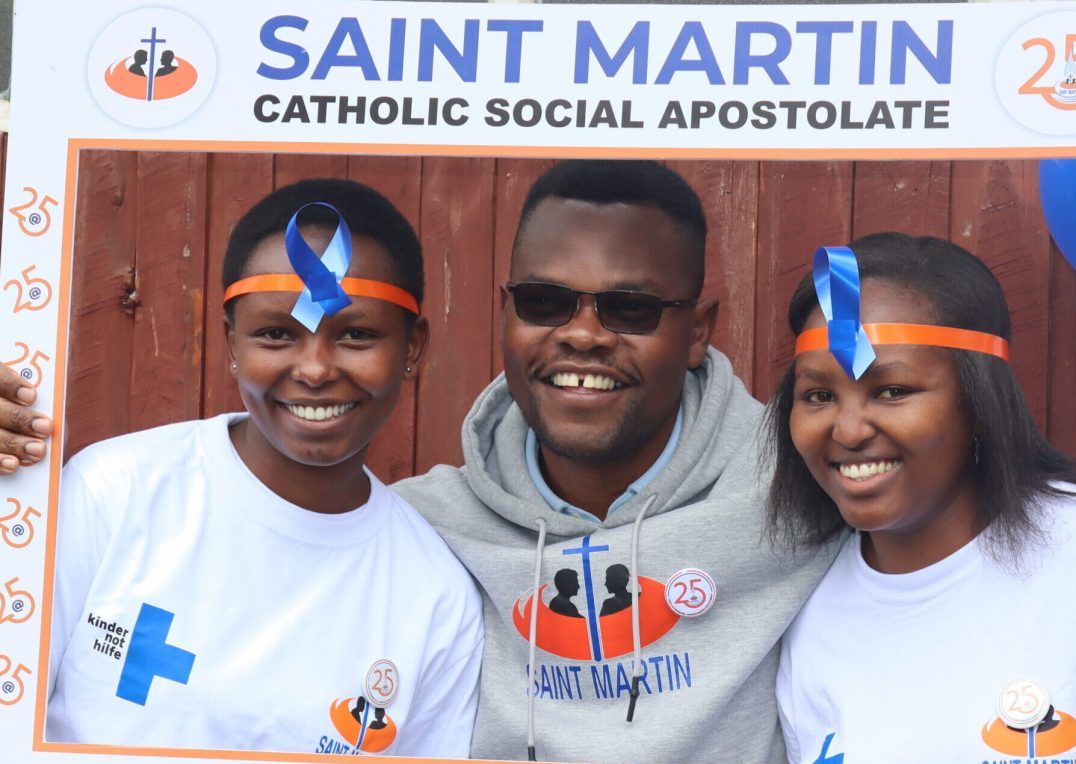Our History
The Beginning (1997-1999)
In 1997, a priest in the Nyahururu parish was asked to bless a home in a rural village. During the blessing, which included the people, animals, and property, the priest encountered Thomas, a man with both mental and physical disabilities, sitting on the dirty floor behind a door. This chance encounter marked a pivotal moment with profound implications. The priest questioned how it was possible that everything, even the animals, was blessed, yet the most vulnerable individual in the house, Thomas, was overlooked and neglected. He wondered if, as Christians, they were neglecting some of their core duties to care for society’s most marginalized.
In response to these reflections, a group of parish volunteers was mobilized to start a Community Program for People with Disabilities. Sadly, Thomas himself would not benefit from this initiative as he passed away shortly after the meeting with the priest. However, his life and death became the catalyst that inspired the volunteers to dedicate themselves to supporting people with disabilities in the community.
This was the beginning of St. Martin Catholic Social Apostolate (CSA). The group of volunteers had no experience with disability issues and had to quickly learn how to manage different disabilities and identify the appropriate interventions. Their first task was to assess how many people with disabilities lived in their parish. To their surprise, after raising awareness in churches on Sundays, hundreds of children with disabilities were identified and registered, children who had been hidden for years, living in isolation and largely forgotten.

In the same year, a second group of volunteers was formed to address issues of violence within society. Violence had become a common response to conflict, and even those volunteers who attended the first seminars on Active Non-Violence struggled to believe that there could be alternative ways to resolve conflicts. However, after completing the seminar, the volunteers enthusiastically began training others in the community on the principles of Active Non-Violence, spreading these transformative methods to a wider audience.
Volunteering was a new concept to the people in the community, and in the early stages, significant emphasis was placed on the spiritual formation of the volunteer committees, what was referred to as “the development of the heart.” This focus on spiritual growth helped those involved to offer their time, energy, and even personal resources for the benefit of those in need.
In the early years, all activities were carried out by volunteers. There were no paid staff members, and resources were minimal. However, in 1999, several offices from the former Catholic Dispensary became available, and an old Land Rover was purchased to facilitate transportation for the growing work of the organization.

Growing the Organization
In 1999, the need arose to formally register the activities of the volunteers as an official organization. The organization was named after Saint Martin of Tours, chosen as its patron saint. His example of solidarity with the poor and his non-violent way of life inspired many to follow in his footsteps.
This marked the beginning of a new phase in the development of St. Martin CSA, focusing on organizational growth. While there was significant goodwill among the volunteers, it became clear that professionalism was needed to make a lasting impact. The emotional and spiritual development, the “heart”, had been nurtured, but the managerial side, the “head”, had been neglected.
During this phase, the organization took steps to establish formal structures, procedures, and policies. Strategic plans were created through participatory processes, and activities were carried out according to clearly defined objectives and targets, allowing for progress to be monitored and evaluated effectively.
In response to ongoing challenges in the community, two new committees were formed to address urgent issues. One focused on the growing problem of street children in Nyahururu Town, many of whom were scavenging in garbage heaps. The other was dedicated to addressing the high number of HIV/AIDS-related deaths. Additionally, food-for-work projects were initiated in response to a severe drought in 2000.
By 2002, a Community Programme for Micro-Credit was established to economically empower the organization’s beneficiaries, providing them with the tools they needed to improve their livelihoods.
This period also saw significant growth in the organization’s staffing. What had once been entirely volunteer-driven work was now supported by employees. This expansion allowed for the training of more community volunteers and enabled the organization to undertake tasks that were beyond the capacity of volunteers alone, such as running rehabilitation centers for street children. This development marked a key turning point in St. Martin CSA’s ability to make a deeper and more sustainable impact on the community.
Deepening the Identity
After the second phase, during which many programs were expanded, St. Martin CSA entered a period of consolidation. This phase focused on strengthening the management structures and deepening the organization’s identity, making its values and approach clearer and more explicit. The importance of this identity became increasingly apparent, especially as the need to induct new staff and volunteers into the organization’s core values grew.
During the previous phase, there was concern that the role of community volunteers might be overshadowed by the growing number of paid staff. It became essential to reaffirm that the volunteers are the heart of the organization, while the staff merely act as facilitators. Volunteers were seen as the individuals who directly carried out the work in the community, while staff supported and enabled their efforts. This concept was emphasized during St. Martin CSA’s day celebration in November 2003, when it was highlighted that the organizational structure on display was not aligned with the organization’s core values. After further reflection, the decision was made to flip the organizational chart, placing the volunteers and facilitators at the top and the management and directors at the bottom, symbolizing the true structure of the organization.

During this period, the organization also took the crucial step of formalizing its vision and mission, which clearly stated that the focus was on the community. The mission emphasized the role of the ‘able’, volunteers and others in the community who had talents and resources that could be shared with the vulnerable. To ensure the organization remained focused on this community-centered approach, the motto “ONLY THROUGH COMMUNITY” was adopted.
Between 1999 and 2002, much emphasis was placed on developing the “head,” focusing on increasing professionalism. However, the next phase would be marked by efforts to balance both the development of the “head” and the “heart.” It became clear that while providing technical skills to volunteers was essential, the importance of nurturing the heart, spiritual and emotional development, could not be overlooked. To support this, a spiritual formation team was formed, and the “Spirit of St. Martin,” the biblical foundation of the organization, was emphasized.
As staff and volunteers worked closely with the beneficiaries, they realized that their own hearts had been transformed in the process. This realization led to a shift in perspective: the vulnerable, once seen as a “problem” to be solved, were now recognized as a valuable resource. They had the capacity to change the hearts of those who helped them, fostering love and solidarity in the process.
Over the years, St. Martin CSA has evolved into more than just an organization; it has become a movement, one that believes in the transformative power of communities when values such as love and solidarity are promoted. This movement is not external to the community but an integral part of it, drawing in as many people as possible to work together for change. Through the efforts of hundreds of volunteers and supporters, St. Martin CSA continues to grow as a community-driven movement, deeply rooted in the principles of care, support, and unity.

